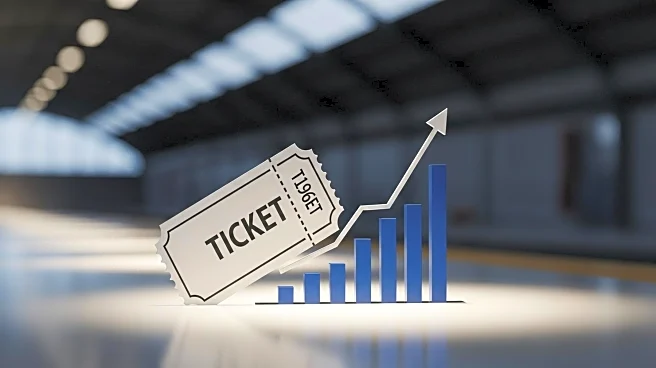What's Happening?
Metra has unveiled its proposed 2026 budget, which includes a fare increase averaging 13% per ride for commuters. This decision comes as the agency faces a structural budget deficit due to dwindling federal pandemic relief funds and stagnant ridership levels. Despite the fiscal challenges, Metra plans to maintain train service next year, even if state lawmakers do not approve additional transit funding during the upcoming legislative veto session. The proposed budget, totaling $1.1 billion, anticipates running out of relief funds by the end of next year. Fare increases will affect one-way rides and monthly passes across various zones, with reduced fare rates also seeing hikes. Metra's budget proposal includes $55 million for improvements on the Metra Electric Line, with reimbursement expected from the Northern Indiana Commuter Transportation District. The agency is also planning a capital budget program of $575.3 million for infrastructure upgrades.
Why It's Important?
The proposed fare increases are a direct response to Metra's financial challenges, highlighting the broader issue of transit funding and sustainability. As federal relief funds dwindle, transit agencies like Metra must find ways to balance budgets while maintaining service levels. The fare hikes could impact ridership, as commuters weigh the cost against alternative transportation options. The situation underscores the need for legislative action to secure additional funding and prevent service cuts in the future. The fiscal health of transit agencies is crucial for urban mobility, economic activity, and environmental sustainability, making this budget proposal significant for stakeholders across the region.
What's Next?
State lawmakers are set to convene for a legislative veto session, where transit funding will be a key agenda item. Metra has prepared an alternate budget scenario that includes modest service expansions, contingent on legislative approval of additional funding. The agency's financial outlook will depend heavily on the outcome of these discussions. If lawmakers fail to secure more funding, Metra may face severe service cuts by 2027. The Regional Transportation Authority's revised deficit estimates could influence legislative priorities and decisions during the session.
Beyond the Headlines
The fare increases and budget proposal reflect broader challenges in public transit funding and management. The reliance on federal relief funds highlights vulnerabilities in transit agency financing models. The situation raises questions about the sustainability of current funding mechanisms and the need for innovative solutions to support transit infrastructure. The potential service cuts in the future could have long-term implications for regional mobility and economic development, emphasizing the importance of proactive legislative and policy measures.









